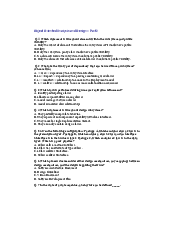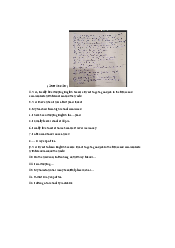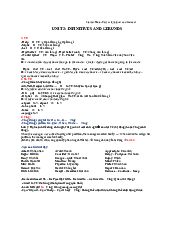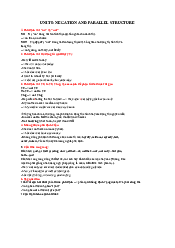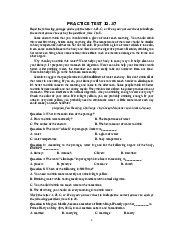

Preview text:
UNIT 4 – PARTCIPLES and PARTICIPLE CLAUSES I.
Participles: Participles are used as adjectives
1. Participle: “V-ing” -
If the participle of a noun is the agent (doing the action of the participle), an “–ing” form is chosen. -
A V-ing participle is used to describe the characteristics, nature and personality of
people or things, usually used with active meaning.
Ex: Marina is sitting on her desk next to the window, seeing the falling leaves. 2. Past Participle -
If the participle of a noun is NOT the agent (NOT doing the action of the participle), a “-ing” form is chosen. -
A past participle is used to describe the feelings or condition of people or animals
about something, usually used with passive meaning.
Ex: The thief got into the room through the broken window. II. Participle clauses
Participle clauses are non-finite clauses. They use a present participle or a past participle
to reduce a main clause. Participle clauses are common in written English. We can use
them to reduce active and passive sentences.
1. The reduced active Sentences 1.1.
Having only one participle in a participle clause. Ex: -
Most of the students just stood outside talking. -
We saw a dog chasing a cat, passing the front door. -
Cut above the right eye, the boxer was unable to continue. 1.2.
A participle in a role of a subject.
The subject in the participle clause and in the main clause is the same. Ex: -
Swimming in the sea every morning, he gets fitter and fitter. -
Walking across the field, we saw a plane fly past. -
Sitting at a table, they listened to the band.
The subjects in the participle clause and in the main clause are different. (these clauses are not easily misunderstood) Ex: -
Knowing how little time she had, this new delay made her impatient. -
When adjusting the machine, the electricity supply should be disconnected.
The same subject is not necessary when “following, considering, regarding” are used. Ex: -
Following the lecture, we were able to ask questions. -
Considering the awful weather, our Open Day was a great success. -
No action has been taken regarding your complaint.
2. The reduced passive sentences
We use the past participle to reduce a passive clause. Ex: -
Blown to the right by the hair-dryer, her hair could easily be cut.
(Long form: Her hair was blown to the right by the hair-dryer and could easily be cut.) -
I preferred the third book written by our professor.
(Long form: I preferred the third book that was written by our professor.)
